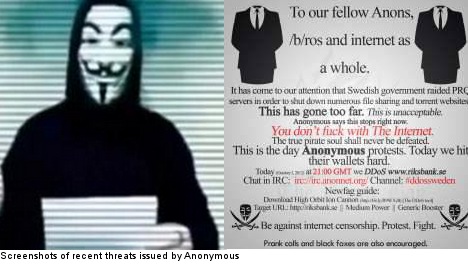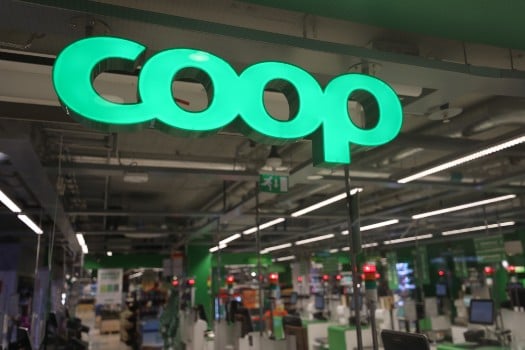“It’s come to our attention that Swedish government raided PRQ servers in order to shut down numerous file sharing and torrent websites,” wrote the Anonymous group on English-language image board website 4chan on Wednesday.
“This has gone too far. This is unacceptable. Anonymous says this stops right now. You don’t fuck with The Internet… Today we hit their wallets hard.”
The message continued by explaining that at 10pm on Wednesday the group will carry out a Distributed Denial of Service (DDOS) attack on Sweden’s Riksbank website.
During a DDOS attack, a website is bombarded with communication requests so that the servers become overloaded and the site crashes, and late Wednesday night the Riksbank’s website was inaccessible.
“We’ve been hit by a DDOS attack,” Riksbank spokesperson Fredrik Andersson told the TT news agency around 10.30pm on Wednesday.
A spokesperson for the Swedish Civil Contingencies Agency (Myndigheten för samhällsskydd och beredskap – MSB) told the Nyheter24.se news website that several other government related websites were hit including the Courts Administration (Domstolverket), the Armed Forces, the Riksdag, security service Säpo and the website of the government offices.
Earlier in the day, the Riksbank indicated it was taking the threat seriously:
“We recognize this as a public threat against websites and we are always trying to keep the web as safe as possible. We have people who are responsible for taking care of the web and IT security,” said Charlotta Edler, spokesperson of the Riksbank to the Svenska Dagbladet newspaper (SvD).
Police are also looking into the matter.
“We’re taking this threat as seriously as we did those previous. It’s hard to judge which are most serious, but anyone handling IT should ensure that the systems can withstand threats,” said Anders Ahlqvist, an IT crimes expert with the Swedish police.
Throughout Wednesday, many university sites around the world were also hacked, including Sweden’s Uppsala and Lund universities.
Over 100 universities were hacked worldwide, according to Sweden’s national broadcaster Sveriges Television (SVT), including Cambridge in the UK and Harvard, Princeton and Stanford in the US.
The warning for Wednesday night’s attack came soon after the official website of Sweden’s National Board of Health and Welfare (Socialstyrelsen) went down on Tuesday night, although no one has so far claimed responsibility for this.
Websites for the Swedish government offices and for the Riksdag, Sweden’s parliament, were rendered inaccessible as well on Wednesday night
The Local/og



 Please whitelist us to continue reading.
Please whitelist us to continue reading.
Member comments